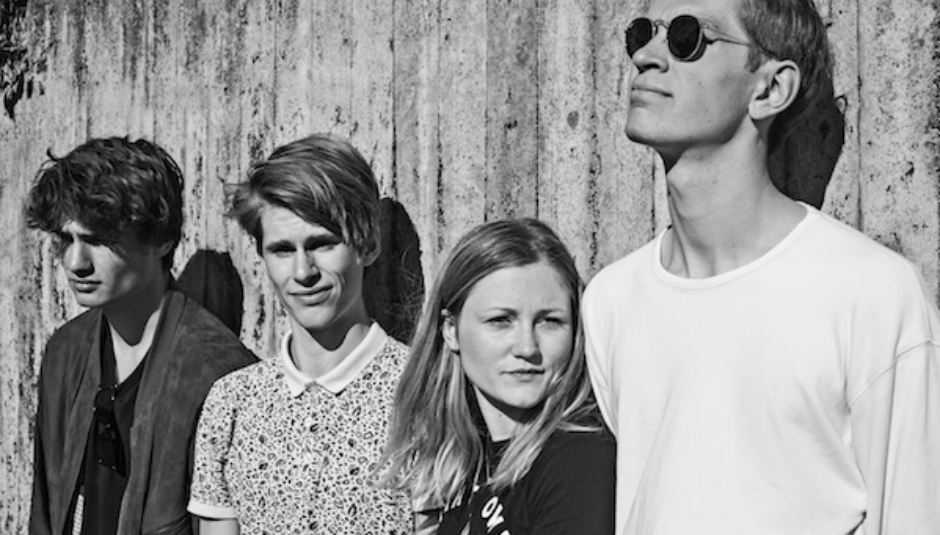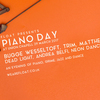Punk bands have been defying gender norms and taking political stands for decades, but few contemporary ones do it with the eye for detail and penchant for massive hooks as Stavanger, Norway’s Sløtface. They’ve been on an unbelievable tear of late, starting with the release of ‘Shave My Head,’ a song that flips the tired unstable girlfriend narrative on its head in late 2015, and continuing with their Empire Records EP last October.
Currently wading through the organized chaos that is SXSW, the band’s singer, Haley Shea, and lead guitarist, Tor-Arne Vikingstad, took some time to chat with DiS about their origins, how their feminist vision helped them grow into their name, and the importance of high school rom-coms.
DiS: What’s it like for Sløtface playing in the U.S. vs. the U.K. vs. back at home? Haley Shea: The difference isn’t huge; we still play the same sets. But we have noticed that the American audiences are really positive, they want to come talk to you after the show and say hi, which doesn’t always happen in the U.K. even though we encourage people to. People generally outside of Norway seem to be really attentive.
Norway and Scandinavia as a whole have a really strong scene of punk bands and indie rock bands. What was the music culture like where the four of you grew up? What got you into making music?
Where we grew up the under-18 scenes you could go to were usually straight-edge hardcore shows, so we grew up going to a lot of those because those were the only shows that we could get into. Hard rock is really big on the west coast where we’re from.
So when Sløtface formed was it a straight-up rock band?
HS: We kind of really were into pop music, but we really loved the energy of live shows from the hard rock, straight-edge scene, so we wanted to combine our two loves.
What’s the origin of the name Sløtface?
Tor-Arne Vikingstad [to Haley]: What’s the story that you want to tell? [both laugh]
HS: It started off as a joke, pretty much. I had a really strong idea that I wanted us to be a female-fronted band, I wanted us to be not viewed as taking ourselves too seriously, it was supposed to be funny and the opposite of all these super intense, emotive bands. But then we learned more about feminism, and we learned about SlutWalks, and the whole concept in feminism of taking ownership of derogatory terms, and it seemed to fit on a deeper level.
And as we moved into our later teens we began writing music that was more directly feminist and riot grrrl inspired, so we kind of grew into our name.
People in music journalism often make a big deal about female-fronted bands with all-male members? Is that something that a distinction that you’re tired of seeing made?
TV: We thought we’d get a lot more questions about it. Obviously we get called female-fronted. We do hope in our lifetime we get to a point where we’re just referred to as a band.
We expected to be asked like, ‘What’s it like to be a girl in an all-male band?’ and sexists questions like that. But we’ve heard those questions a lot more from artists, not as much from press. It’s more people playing in other bands like, ‘I could never do that.’
It’s happened like three or four times at least, maybe journalists have become more aware of it. It’s still obviously a problem though; sexist music journalism is a problem.
HS: We really do kind of think though that we should give attention to cool women in rock and punk, we want to end up in an industry that’s 50-50. We do believe in showcasing really good role models.
You released a lot of songs between the end of 2014 with We’re Just Ok and then all of last year. How do you think your sound has grown and changed over the last couple years?
TV: We started out doing it all ourselves, not really knowing how. We played in bands and stuff but you need to do it for many, many, many years to be good at it. We basically spent the past four years just playing music, And that’s what’s changed, as well just being better at it. What’s the rule? 10,000 hours? I guess you just move towards that all the time, and being so involved in touring and being more conscious when you listen to something, you pick up more. I pick up a lot more stuff now than I did before. ‘Empire Records’ is basically a country-blues riff, we were listening to Stevie Ray Vaughn. You can bring that into the pop-punk world; the music we’re listening to now is rap, hip-hop, rock.
You do such a terrific job capturing these incredibly specific personal moments in your lyrics. On a track like ‘Shave My Head’ is that inspired by a specific experience or is that like a composite?
HS: in all seriousness it’s always snapshots of different stuff. Usually, I come up with lyrics while we’re all jamming on songs, working on arrangements, and I’ll scribble while we’re doing that. All my favorite lyricists are really, really specific. That’s what I’m striving for, though I don’t know if you ever get to the point where you’re as good as your heroes.
A song might not appeal to everybody but when you get that one lyric you connect with it really makes the song mean so much more to you.
Could you explain a bit about the track ‘Sponge State’ and what that’s about? And then I want to know about the video because I thought that was so cool and a really clear way to address the situation at Førde Fjorde. It reminded me of all the musicians nowadays going to Standing Rock.
TV: It was from our point of view being proactive and doing something. We’ve seen all these other young people saying, ‘I wish I lived in the ‘70s and ‘80s in a time when things actually happened.’ And that’s such a weird thing to say because there are opportunities to do that now.
The protest on the mountain [in the video] I thought was one of those things. Lots of kids had the opportunity to go out and protest. It was really spontaneous, one of our friends was saying, ‘I think I’m going to go up on Monday and volunteer and be part of this protest,’ and a lot of people we like and know and follow on social media were already up there and we wanted to showcase this cause to a whole different audience.
HS: Pretty much in 2017, anybody that’s engaged in culture and what you’d call in the U.S. liberal are sort of uniting in this common project to fight extremism in whatever way they can. As a musician you have a certain power and set of tools that are completely different than what a politician has, there are lots of ways that you can affect change but it’s all of us uniting against right-wing extremism that’s blowing across Europe and with Trump being elected.
What is it that really inspired the band about Empire Records? Why'd you want to name not just the song but the EP after that?
HS: We just have a real thing for late ‘90s early 2000s high school rom-coms. Our generation has this set of references that really influence the way you think about relationships and what it’s supposed to be like to be a teenager. Picking up the clichés of John Hughes movies that we all really love and bringing those ‘80s references into the ‘90s and early 2000s. It’s that whole idea of romanticizing things when you’re a teenager, both High Fidelity and Empire Records were movies that capture that to us as teenagers.
Obviously you guys have gone through all the usual dumb things of being mislabeled and misidentified. I read somewhere you were called an all-female band. How would you in your words describe Sløtface?
HS: Just to feel like, while we have a long way to go, you leave the show and feel like you experienced something. Sometimes you’ll be at a show and it’s really good and you stand at the back and nod your head and sip a beer and other times you leave and you’re like, ‘Shit, that was a big deal.’ We want it to be so everyone leaves a show and feels that way and wants to record an album or make a zine or talk to the people they don’t know around them.






















